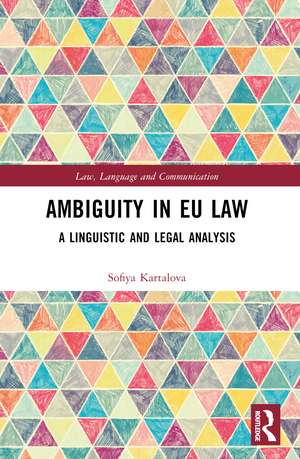Ambiguity in EU Law: A Linguistic and Legal Analysis: Law, Language and Communication
Autor Sofiya Kartalovaen Limba Engleză Paperback – 27 mai 2024
This ground-breaking work challenges some of the theoretical assumptions about ambiguity in EU law and puts forward a more accurate and complete theory about the CJEU’s strategic use of ambiguity. Ambiguity is here transformed from an underestimated or misunderstood detail of undetermined significance to a desirable systemic feature of the EU legal order with concrete properties and impact. Ambiguity as the implicit basis of the CJEU’s decision-making is shown to be strategically valuable for the implementation of the authority of EU law at some of the most pivotal moments in the evolution of the EU legal order. This interdisciplinary investigation presents in-depth linguistic and legal analysis of ambiguity found in the text of key provisions of EU Treaties and in the language of some of the CJEU’s leading preliminary rulings in the area of fundamental rights, freedom of movement and EU citizenship. The book suggests a categorisation of examples, basic guidance about the type of case and situation where the phenomenon is likely to emerge as well as an assessment of the advantages and disadvantages of this unusual judicial technique.
The book will be a valuable resource for researchers and academics working in the areas of Law and Language, Public International Law, EU Law and Multilingualism.
| Toate formatele și edițiile | Preț | Express |
|---|---|---|
| Paperback (1) | 260.07 lei 43-57 zile | |
| Taylor & Francis – 27 mai 2024 | 260.07 lei 43-57 zile | |
| Hardback (1) | 867.87 lei 22-36 zile | +26.11 lei 5-11 zile |
| Taylor & Francis – 7 oct 2022 | 867.87 lei 22-36 zile | +26.11 lei 5-11 zile |
Din seria Law, Language and Communication
-
 Preț: 326.14 lei
Preț: 326.14 lei - 20%
 Preț: 251.70 lei
Preț: 251.70 lei -
 Preț: 489.26 lei
Preț: 489.26 lei - 19%
 Preț: 259.98 lei
Preț: 259.98 lei - 17%
 Preț: 259.98 lei
Preț: 259.98 lei - 17%
 Preț: 259.98 lei
Preț: 259.98 lei - 13%
 Preț: 338.33 lei
Preț: 338.33 lei - 25%
 Preț: 851.40 lei
Preț: 851.40 lei -
 Preț: 350.72 lei
Preț: 350.72 lei - 19%
 Preț: 256.02 lei
Preț: 256.02 lei -
 Preț: 493.30 lei
Preț: 493.30 lei - 17%
 Preț: 259.98 lei
Preț: 259.98 lei - 17%
 Preț: 259.98 lei
Preț: 259.98 lei - 16%
 Preț: 274.25 lei
Preț: 274.25 lei - 13%
 Preț: 338.33 lei
Preț: 338.33 lei -
 Preț: 389.01 lei
Preț: 389.01 lei -
 Preț: 389.38 lei
Preț: 389.38 lei - 17%
 Preț: 237.44 lei
Preț: 237.44 lei -
 Preț: 387.38 lei
Preț: 387.38 lei - 17%
 Preț: 258.89 lei
Preț: 258.89 lei -
 Preț: 388.90 lei
Preț: 388.90 lei - 16%
 Preț: 130.21 lei
Preț: 130.21 lei - 18%
 Preț: 1002.02 lei
Preț: 1002.02 lei - 18%
 Preț: 1001.55 lei
Preț: 1001.55 lei -
 Preț: 389.60 lei
Preț: 389.60 lei - 18%
 Preț: 1002.60 lei
Preț: 1002.60 lei - 18%
 Preț: 1010.26 lei
Preț: 1010.26 lei
Preț: 260.07 lei
Preț vechi: 311.47 lei
-17% Nou
Puncte Express: 390
Preț estimativ în valută:
49.77€ • 52.09$ • 41.42£
49.77€ • 52.09$ • 41.42£
Carte tipărită la comandă
Livrare economică 31 martie-14 aprilie
Preluare comenzi: 021 569.72.76
Specificații
ISBN-13: 9781032279916
ISBN-10: 1032279915
Pagini: 244
Ilustrații: 2
Dimensiuni: 156 x 234 x 18 mm
Greutate: 0.46 kg
Ediția:1
Editura: Taylor & Francis
Colecția Routledge
Seria Law, Language and Communication
Locul publicării:Oxford, United Kingdom
ISBN-10: 1032279915
Pagini: 244
Ilustrații: 2
Dimensiuni: 156 x 234 x 18 mm
Greutate: 0.46 kg
Ediția:1
Editura: Taylor & Francis
Colecția Routledge
Seria Law, Language and Communication
Locul publicării:Oxford, United Kingdom
Public țintă
PostgraduateCuprins
Part 1: In Search of the Strategic Value of Ambiguity for the Authority of EU Law 1. Introduction 2. Ambiguity in Legal Texts 3. Ambiguity in EU Law 4. A Framework for Analysis Part 2: The Case Studies 1. Judicial Activism Reconsidered?: The CJEU’s Strategic Resolution of Ambiguity in Melloni (Case C-399/11) 2. Judicial Activism Reinvented?: The CJEU’s Strategic Production of Ambiguity in Åkerberg Fransson (Case C-617/10) 3. Judicial Restraint Reconfirmed?: The CJEU’s Strategic Resolution of Ambiguity in Keck (Joint cases C-267/91 and C-268/91) 4. Judicial Activism in Retrospect?: The CJEU’s Strategic Resolution of Ambiguity in Ruiz Zambrano (Case C-34/09) and Dereci (C-256/11) Part 3: Ambiguity as a Desirable Systemic Feature of the EU Legal Order
Notă biografică
Dr. iur. Sofiya Kartalova is a Postdoctoral Researcher at the Department of Public Law at the Max Planck Institute for the Study of Crime, Security and Law, Freiburg im Breisgau, Germany.
Descriere
This interdisciplinary investigation presents in-depth linguistic and legal analysis of ambiguity found in the text of key provisions of EU Treaties and in the language of some of the CJEU’s leading preliminary rulings in the area of fundamental rights, freedom of movement and EU citizenship.
